South Korea's Asiana Airlines And Korean Air Abide By Chinese Air Defense Identification Zone (ADIZ)

South Korea's two biggest airlines announced on Thursday that they would comply with China’s controversial Air Defense Identification Zone (ADIZ), which conflicts with previously established areas marked by Japan and South Korea.
China’s newly established ADIZ extends to some disputed areas of the East China Sea, much to the dismay of neighboring Japan and South Korea. China’s ADIZ requires all aircraft to submit flight plans and identification details to Chinese air traffic control and authorities, something that two major Korean airlines have decided to adhere to. U.S. airlines that fly in the area, meanwhile, have said they will not.
According to the AFP, an Asiana Airlines spokeswoman confirmed that the airline will be complying with China’s ADIZ requests. “We started submitting flight plans as of today,” the spokeswoman confirmed. In addition, Korean Air has also confirmed compliance.
Though South Korea’s airlines have decided to go along with China’s ADIZ, the official stance of the government is to reject the claim. In fact, a few weeks after China’s establishment of the ADIZ, South Korea’s government announced an extension of its already existing air defense zone, which overlapped territory claimed not only by China but also by Japan.
South Korea’s Transportaton Minister Suh Seoung-hwan announced on Wednesday that national airlines were given individual authority on whether or not to abide by the rules set forth by China, but he stressed to journalists that the decisions of the commercial airlines in no way reflected Seoul’s official position rejecting China's claim to the zone.
China’s ADIZ includes the hotly disputed islands known as the Diaoyu to Chinese and Senkaku to Japanese, in addition to a small underwater rock formation known to Korea as the Ieodo and to Chinese as Suyan Rock.
© Copyright IBTimes 2024. All rights reserved.






















